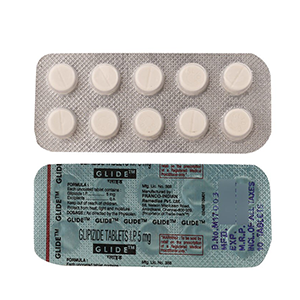
We accept Bitcoins
Get 10% discount!!!
Glide (Glipizide)

The image may differ from the actual product
Manufacture: Franco-Indian Pharmaceuticals Pvt. Ltd./ USV Pvt. Ltd.
Glide (Glipizide) is used for treating type 2 diabetes in patients who cannot control blood sugar levels by diet and exercise alone. Treatment is combined with diet and exercise. The medicine helps your body to use insulin better.
INTRODUCTION
Glide (Glipizide) is a medicine used to treat type 2 diabetes mellitus in adults. It belongs to a group of medicines called sulfonylureas and helps control blood sugar levels in people with diabetes. This helps to prevent serious complications of diabetes like kidney damage and blindness.
Glide (Glipizide) may be used by itself or along with other medicines. It should be taken on an empty stomach. Take it regularly at the same time each day to get the most benefit. Your doctor will decide what dose is best for you and this may change from time to time according to how it is working.
Keep taking this medicine even if you feel well or your blood sugar levels are controlled. If you stop it without consulting your doctor, your blood sugar levels could rise and put you at risk of kidney damage, blindness, nerve problems and loss of limbs. Remember that it is only part of a treatment program that should also include a healthy diet, regular exercise, and weight reduction as advised by your doctor. Your lifestyle plays a big part in controlling diabetes.
The most common side effects of taking this medicine include diarrhea, nervousness, tremor, and flatulence. It can also sometimes cause low blood glucose levels (hypoglycemia). Make sure you recognize the signs of having low blood glucose levels, such as sweating, dizziness, headache, and shaking and know how to deal with it. To prevent this, it's important to have regular meals and always carry a fast-acting source of glucose such as sugary food or fruit juice with you. Drinking alcohol can also increase your risk of low blood sugar levels and should be avoided. Some people may find that they put on weight with this medicine.
You should not take it if you have type 1 diabetes mellitus, if you have diabetic ketoacidosis (high levels of acid in your blood), or if you have severe kidney or liver disease. Before taking this medicine, tell your doctor if you have ever had heart disease, thyroid disease or some hormonal conditions. It may not be suitable. Pregnant or breastfeeding women should also consult their doctor before taking it. Your blood sugar levels should be checked regularly and your doctor may also advise blood tests to monitor your blood cell counts and liver function.
SIDE EFFECTS OF GLIDE TABLETS
Most side effects do not require any medical attention and disappear as your body adjusts to the medicine. Consult your doctor if they persist or if you’re worried about them.
Common side effects of Glide (Glipizide):
Dizziness;
Diarrhea;
Nervousness;
Tremor;
Hypoglycemia (low blood glucose level);
Flatulence.
HOW TO COPE WITH SIDE EFFECTS?
The occurrence of side effects varies from person to person. However, consult your doctor if the ones above persist.
HOW TO USE GLIDE TABLETS
Take this medicine in the dose and duration as advised by your doctor. Swallow it as a whole. Do not chew, crush or break it. Glide (Glipizide) is to be taken on an empty stomach.
SAFETY ADVICE
Alcohol
It is unsafe to consume alcohol with Glide (Glipizide) tablets.
Pregnancy
Glide (Glipizide) tablets may be unsafe to use during pregnancy. Although there are limited studies in humans, animal studies have shown harmful effects on the developing baby. Your doctor will weigh the benefits and any potential risks before prescribing it to you. Please consult your doctor.
Breastfeeding
Glide (Glipizide) is probably safe to use during breastfeeding. Limited human data suggests that the drug does not represent any significant risk to the baby. Monitoring of the breastfed infant's blood glucose is advisable during maternal therapy with Glide (Glipizide).
Driving
Your ability to drive may be affected if your blood sugar is too low or too high. Do not drive if these symptoms occur.
Kidney
Glide (Glipizide) should be used with caution in patients with severe kidney disease. Dose adjustment of Glide (Glipizide) may be needed. Please consult your doctor.
These patients can experience very low blood sugar levels with this medicine, which may take a long time to come back to normal.
Liver
Glide (Glipizide) should be used with caution in patients with severe liver disease. Dose adjustment of Glide (Glipizide) may be needed. Please consult your doctor.
WHAT IF YOU FORGET TO TAKE GLIDE TABLET?
You should skip a dose of Glide (Glipizide) if a meal is skipped, and add a dose of medicine if you eat an extra meal.

 English
English 









